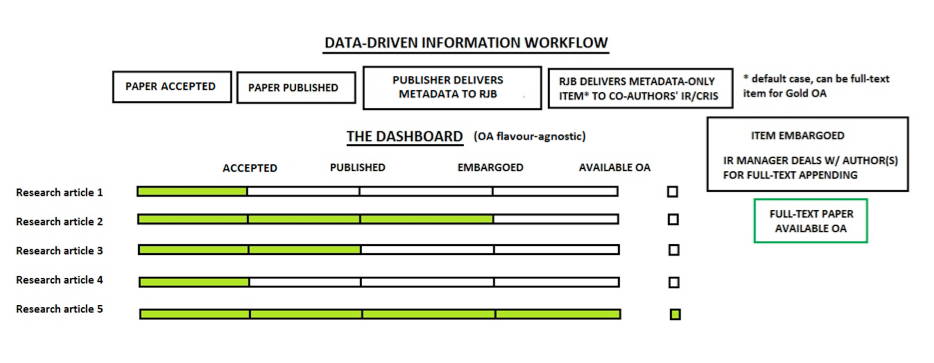Proposed dashboard for tracking OA mandate compliance
This use case outlines potential user requirements and technical development considerations for a proposed dashboard tool monitoring compliance rates with regard to funder policies on Open Access (OA). This proposed dashboard, as part of its wider remit, would also help track various outputs and payments as funded research progresses through stages towards OA publication.
Description
The RepNet Dashboard aims to provide a tool for monitoring the rates of compliance for the funders’ Open Access policies as part of its wider remit for tracking Open Access outputs and payments. The Dashboard will offer information on the degree of progress of funded-project outputs (focusing mainly on research articles) along their way towards being made available as Open Access research outputs. The initial Dashboard concept focuses on institutional monitoring of Open Access outputs, but can later be extended to cross-institutional monitoring and Open Access payments too.
Although very useful as well to institutions and funders, the Dashboard is mainly a tool for Institutional Repository (IR) managers. This proposed dashboard will enable these managers to tell which institutional research outputs are affected by a funder mandate and what their stage is on the way to being made available OA. This information will be extremely useful for increasing mandate compliance levels and full-text content levels in Institutional Repositories when shared with the authors.
Dependencies
- RIO Extension Guidelines for Metadata Enhancement
- Survey for mapping research information management system availability at UK HEIs
Note: This survey is required to tell whether HEIs will rather rely on their Institutional Repositories or on their CRIS to provide this specific reporting feature. Those institutions where no CRIS is available will by default resort to their Information Repositories, therefore making the case for the functionality to be delivered this way. But there is currently no accurate picture of which HEIs are potentially relying on their Institutional Repositories for this kind of complex overlay service. - Simple CERIF / OAI-PMH mapping
- IRUS-UK: Institutional Repository Usage Statistics (RepNet Wave 1 component)
Data dependencies
Sufficiently good metadata for a published paper will be by default provided by publishers into CRIS/IRs via RJ Broker service. Guidelines will need to be established to cover both ends of the RJ Broker-mediated transfer (source/publisher side: periodicity, metadata format, sufficient data on affiliation, sufficient coverage; target/Institutional Repository side: service configuration and testing, collection allocation, review & enhancement procedure; RJ Broker side: automatic relevant metadata assignement).
Once metadata (plus potentially digital object) transfer is performed, allocation of embargoes becomes IR manager responsibility, incl. ensuring the appropriate metadata fields get updated as the publication progresses towards OA availability.
Usefulness
The Dashboard is of great use to Institutional Repository managers, institutions (especially those where no CRIS is available) and funders, and will serve to critically enhance Institutional Repository functionality adapting it to the post-Finch Open Access landscape.
The app value is to be measured by periodical (suggested: monthly) snapshots of the rate of mandate compliance (incl. both funder and institutional) since the tool becomes operational. There should be a sustained increase in those rates, which should also be traceable via the Deposit Uptake Monitor through a higher number of full-text content availability in Institutional Repositories.
Feasibility
RepNet is already liaising with relevant initiatives in the JISC Research Information Management strand (ie projects such as IRIOS-2, CiA, UKRISS and/or GtR) in order to share objectives and avoid feature overlapping. RepNet is also in preliminary conversations with EPrints Development Team in Southampton in order to work jointly on the IR-specific side of dashboard-service specifications.
- Log in to post comments

